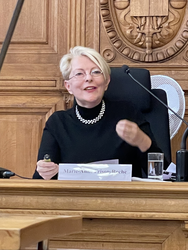Sept. 9, 2024
Conferences

🌐follow Marie-Anne Frison-Roche on LinkedIn
🌐subscribe to the Newsletter MAFR Regulation, Compliance, Law
____
► Full Reference: M.-A. Frison-Roche, "Pourquoi les textes et la pratiques sur le rapport de durabilité vont engendrer un Contentieux Systémique" ("Why the texts and practices on sustainability reporting will give rise to Systemic Litigation"), in Le rapport de durabilité : obligation et Contentieux Systémiques Émergents (The Sustainability Report: Emerging Systemic Obligation and Litigation), in cycle of conference-debates "Contentieux Systémique Émergent" ("Emerging Systemic Litigation"), organised on the initiative of the Cour d'appel de Paris (Paris Cour of Appeal), with the Cour de cassation (French Court of cassation), the Cour d'appel de Versailles (Versailles Court of Appeal), the École nationale de la magistrature - ENM (French National School for the Judiciary) and the École de formation des barreaux du ressort de la Cour d'appel de Paris - EFB (Paris Bar School), under the scientific direction of Marie-Anne Frison-Roche, September 19, 2024, 11h-12h30, Cour d'appel de Paris, Cassin courtroom
____
🧮see the full programme of this event
____
► English summary of the conference: Systemic Litigation refers to a specific category whose proposed category in 2021 refers to "cases" brought before the courts, sometimes specialised, sometimes under ordinary law courts: these are cases in which not only are the parties involved in their dispute but also a system is itself involved, with the procedure and the judge having to allow the interests of the system to be taken into consideration.
However, what is also the subject of new terminology, namely the "Sustainability Report", reflects the same legal revolution: the company must be able to assess not only its economic and financial performance, which is the subject of accounting, but also its development in terms of what it does externally in terms of ESG and what the outside world does about it.
In this perspective, the whole Information System is being transformed, and in different ways depending on the standards adopted, in the United States, Europe or elsewhere, either it is sufficient to obtain Information, no more, so that third parties can adjust their behaviour, mainly investments, or, as in Europe, Law includes a more substantial perspective, so that the company itself adjusts its own behaviour, its Governance, its position in the world, in a renewed relationship with its stakeholders. In Europe, saying and doing are intertwined, CSRD being twinned with CS3D.
Moreover, we can therefore consider that non-financial information, through the sustainability report, its assurance of credibility and the regulation of the audit carried out on it, is itself a system.
The sustainability report, inside the sustainability system, is then interwoven with other systems, which are themselves the subject of Emerging Systemic Litigation: firstly Vigilance, which has been studied as a field of systemic litigation, and then artificial intelligence field, which has been studied in the same way.
The Sustainability Report, insofar as it intersects with the sustainability obligation implied by the duty of Vigilance, may be attracted to the Systemic Litigation to which Vigilance gives rise. In the same way, algorithms can be a tool for data accumulating and matching ESG criteria, which could have the same attraction effect. If this happens, this dimension will have to be present and understood, for example through amici curiae mechanism, in conjunction with the Regulators and the professions concerned.
In addition, as in any emerging mechanism, and as we have seen for example in relation to rating agencies, Tort Law may interfere if the liability of either the company or the person who carried out the audit were to be appreciated, the systemic perspective then having to be integrated into the handling of the case, even before the non-specialised judge.
________
March 10, 2016
Conferences

► Full Reference: M.-A. Frison-Roche, "Le Diable dans la bouteille des Codes de bonne conduite" (The Devil in the bottle of Codes of Conduct). Hommage to Gérard Farjat, Center of Economic Law, Nice, France, 10 March 2016 .
____
► see the conference . (in French)
► see the construction of this conference (in French)
► see the media/assets/slides/les-codes-de-bonne-conduite.pdf"> slides, used as basis for this conference (in French).
____
► English presentation of this conference: In 1978, our mutual friend Gérard Farjat wrote a memorable article on "les codes de conduite privés" ('private codes of conduct') (in French), codes of conduct which have since flourished. I remember that it worried him because he was aware of the rhetoric, and even the contradiction, that these codes contain, and at the same time he did not see what could stop this legitimate way for international companies to organise an 'order' at home, since the Law was no longer able to offer them one from the outside, nor was Law capable of limiting the less virtuous tendency of companies to fashion norms by which they exercise power not only to organise themselves but also to govern others and the outside world.
When Gérard Farjat wrote this article in 1978, Corporate Social Responsibility had not yet been conceived...
Have we reached the same point? Can we even say that the situation has worsened, with the world being "standardised" and "governed" by "global" companies that write and impose codes of "good" conduct that express what is "good" in itself and end up constituting veritable "global constitutions"?
No. In fact, the opposite is true. Through the power of Regulators and Supervisors, institutions of public authority, public standards are internalised in "global" companies, which repeat them in codes of conduct and become their own regulators and supervisors.
________
Updated: July 31, 2013 (Initial publication: Nov. 8, 2011)
Teachings : Les Grandes Questions du Droit, semestre d'automne 2011
